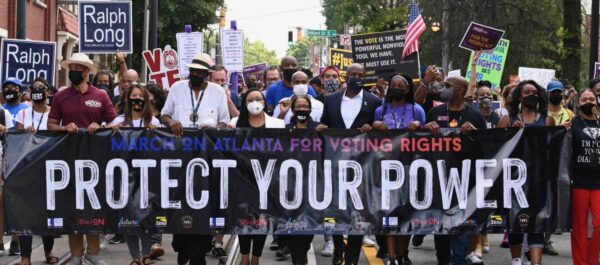Georgia-based Disability Rights Groups Join Fight Against Georgia’s Anti-Voter Law S.B. 202
Three groups joined pending litigation AME Church v. Kemp in an amended complaint that explains how S.B. 202 violates the Americans with Disabilities Act, Rehabilitation Act
ATLANTA — Three prominent Georgia-based disability rights groups have joined the broad-based alliance of Georgia voters, civil rights groups, and activists fighting against the implementation of the state’s unconstitutional and discriminatory Senate Bill (S.B.) 202.
The groups are: (an office of ), , and the (GAO).
These organizations, whose core missions are to advocate for disability rights and support voters with disabilities, are the first disability rights-specific groups to join as plaintiffs in any of the pending lawsuits against S.B. 202.
S.B. 202 was passed by both houses of the Georgia General Assembly and signed into law by Gov. Brian Kemp all in one afternoon.
In joining AME Church v. Kemp in the amended complaint, filed by the American Civil Liberties Union (ACLU), ACLU of Georgia, Southern Poverty Law Center (SPLC), NAACP Legal Defense and Educational Fund, Inc., WilmerHale, and Davis Wright Tremaine, these groups are making it clear that — in addition to targeting Black voters, Latinx voters, other voters of color, new citizens, elderly voters, and student voters — Georgia legislators and the governor have discriminated against people with disabilities.
Voters with disabilities have received scant attention in Georgia's battles over voting rights but have borne the brunt of historical and continuing discrimination and neglect in all spheres of public life. Rather than celebrating the strong turnout in the 2020 general election and runoffs, S.B. 202 doubles down on making voting even more inaccessible for the disability community.
As detailed in the amended complaint, S.B. 202 unconstitutionally burdens the right to vote of people with disabilities and violates the Americans with Disabilities Act, which celebrates its 31th anniversary on July 26, and the Rehabilitation Act of 1973 by imposing voting barriers that will discriminate against voters with disabilities and deny people with disabilities full and equal opportunity to participate in the state's voting programs.
The amended complaint in full, which also adds the (SCLC) as a client is available here: [LINK]
Other plaintiffs in AME Church v. Kemp include: Sixth District of the African Methodist Episcopal Church, Delta Sigma Theta Sorority, Inc., Georgia Muslim Voter Project, Women Watch Afrika, and Latino Community Fund Georgia.
“Georgia’s voting process already presented barriers to people with disabilities and S.B. 202 has made the process even more inaccessible in violation of the law,” said Stacey Ramirez, acting state director of The Arc Georgia. “This lawsuit is critically important to the future of over 850,000 Georgian citizens with disabilities eligible to vote who have a fundamental right to participate in our democracy. If this law is not struck down, the walls it puts around our voting rights will be even harder for people with disabilities to scale, and that’s unacceptable.”
“I served in the U.S. Army, giving my body and soul to defend our Constitution. Now, as a Cherokee Two-Spirit disabled vet, and as an ADAPT activist, I joined this lawsuit to make sure every citizen — whether disabled, Black, Native American, Latinx, or Asian — can participate in the sacred act of voting,” said Zan Thornton of Georgia ADAPT.
“Voting is a fundamental right. Access for people who experience disabilities is generally an afterthought if it’s thought of at all. The change in the voting law creates new barriers for everyone but those barriers could be insurmountable for people who experience disabilities,” said Devon Orland, legal director of the Georgia Advocacy Office.
Amended complaint: /legal-document/amended-complaint-5
To view an ASL video of this press release, please visit:
Case background: /cases/sixth-district-african-methodist-episcopal-church-v-kemp
